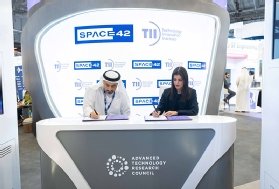
eranda - stock.adobe.com
UAE to launch first space-to-ground quantum communication network
Technology Innovation Institute and Space42 unveil a collaboration at the Dubai Airshow to deliver the UAE’s first space-enabled quantum communication network, strengthening national cyber resilience and advancing sovereign leadership in next-generation secure infrastructure
The United Arab Emirates (UAE) has taken a significant leap forward in next-generation cyber security and sovereign digital infrastructure with an agreement between the Technology Innovation Institute (TII) and Space42. Announced at the 2025 Dubai Airshow, the partnership aims to build and deploy the country’s first space-to-ground quantum communication network, integrating satellite and terrestrial systems powered by home-grown quantum key distribution (QKD) technology.
For years, the UAE has invested heavily in quantum research and advanced communications as part of its broader ambition to become a global technology hub.
From establishing Abu Dhabi’s Advanced Technology Research Council (ATRC) to launching national strategies around cyber security and space innovation, the country has consistently positioned itself at the frontier of disruptive science and secure digital transformation. Quantum communication has rapidly emerged as a critical component of this vision, offering the potential to protect data with security rooted in the fundamental laws of physics.
The newly announced TII-Space42 collaboration marks a decisive step in translating this ambition into a deployable national capability. Under the agreement, the organisations will co-develop, test and validate quantum-secure communication links from space to ground, paving the way for future commercialisation and operational deployment.
“By combining TII’s deep research expertise with Space42’s advanced satellite infrastructure, we are building the foundations of a national quantum communication network that strengthens the UAE’s cyber resilience and sovereignty,” said Najwa Aaraj, CEO of TII. “Together, we are positioning the nation at the forefront of secure communication technologies that will shape the digital economy of the future.”

QKD itself represents a promising security technology for the post-quantum era. Unlike traditional encryption, which can be vulnerable to advances in computing power, QKD relies on the behaviour of quantum particles to distribute cryptographic keys. Any attempt to intercept or tamper with those keys immediately alters their quantum state, alerting both parties and rendering the breach detectable. This makes QKD one of the strongest available tools for securing critical national infrastructure, government communications and sensitive commercial data.
“Through integrating our satellite systems with TII’s QKD technology, we can advance secure, quantum communications from concept to capability, and strengthen the nation’s leadership in next-generation data security,” said Ali Al Hashemi, CEO of Space Services at Space42.
The agreement outlines a comprehensive framework that spans research and development, payload creation, satellite integration and ground infrastructure operations. It also includes plans for in-orbit demonstrations of quantum-secure links, an essential step in transitioning QKD from laboratory settings to real-world, space-enabled deployments. Such demonstrations are expected to accelerate national expertise, support talent development and establish the UAE as an influential player in global quantum communications.
The partnership reflects a strategic shift in how nations are preparing for a post-quantum world. As cyber threats grow more sophisticated, space-based QKD networks offer a pathway to securing communications at national and international scales.
By moving early and investing decisively, the UAE is not only future-proofing its critical infrastructure, but also carving out a leadership role in one of the most transformative technological races of the decade. The UAE is poised to turn its quantum research momentum into tangible capability, reinforcing both its cyber resilience and its position as a rising global centre for sovereign, secure and future-ready technologies.
Read more about quantum computing
- Why the Middle East is winning the quantum race: While Europe debates quantum cyber security policies, the UAE has implemented quantum-resistant algorithm requirements, offering crucial lessons for organisations preparing for the post-quantum era.
- How close is quantum computing to commercial reality? At a recent event, experts explored the progress towards logical qubits and how these will be applied to empower business IT.
- UAE advances urban air mobility with simulation-driven regulatory framework: Abu Dhabi’s TII, Aspire and GCAA are pioneering autonomous flying taxi and delivery drone regulations through advanced simulations and real-world pilot zones.







